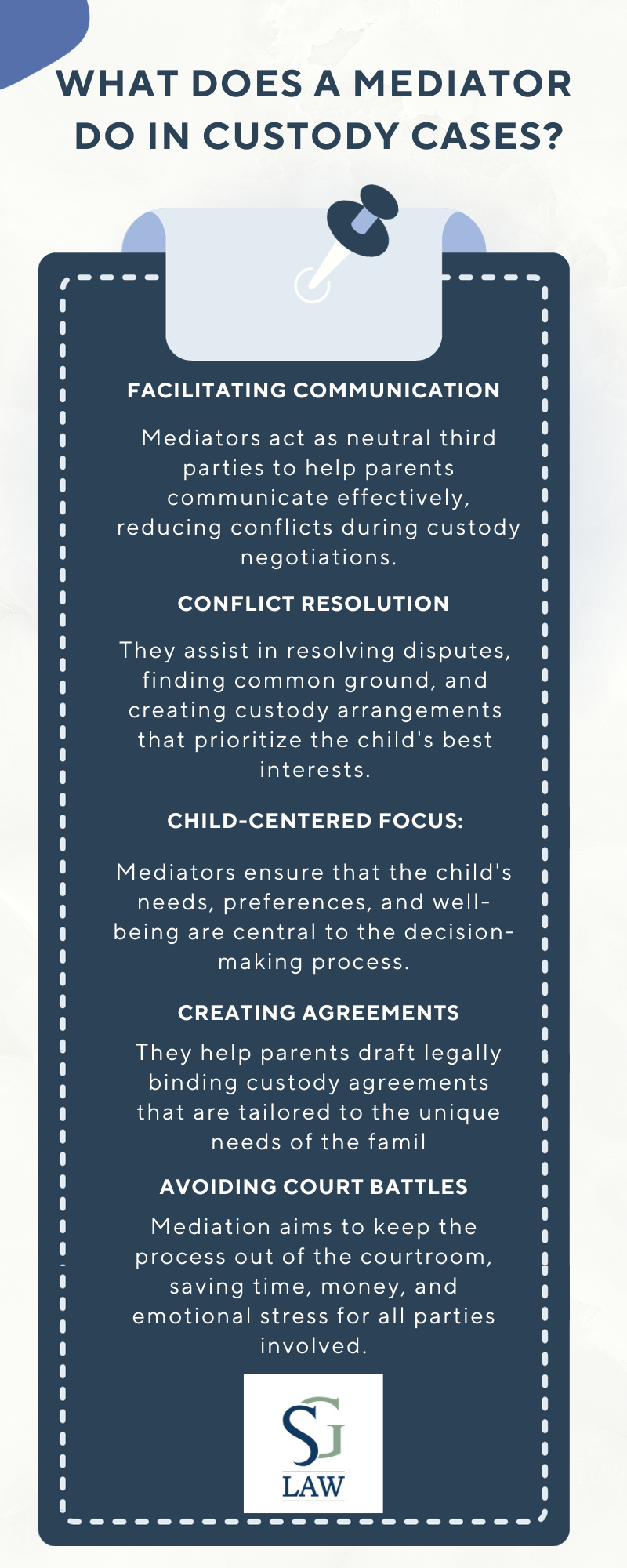When it comes to family law, disputes and conflicts are unfortunately common occurrences. From child custody and visitation issues to property division and spousal support, navigating these legal battles can be emotionally draining and financially burdensome. However, amidst the complexity and adversarial nature of litigation, there exists an alternative approach called mediation. Today, we will delve into what a mediator does and explore the significance of mediation in the context of family law.

What is the Role of Mediation?
In its simplest dictionary definition, mediation is a form of “intervention in a dispute in order to resolve it.” In terms of family law, it’s a voluntary process that brings all of the parties involved in a legal dispute together to help them work towards a mutually acceptable resolution with the assistance of a neutral third party called a mediator. Unlike traditional litigation, which involves courtroom battles and a judge’s decision, mediation focuses on facilitating open communication and finding common ground between the parties.
The Role of a Mediator:
A mediator acts as a guide throughout the process. They are impartial and do not advocate for any party involved. Instead, their primary goal is to assist all parties in reaching an agreement that addresses their interests and concerns. Here are some key aspects of a mediator’s role:
Creating a Safe Environment:
A mediator establishes a safe and respectful atmosphere where all parties can express themselves freely without fear of judgment. This helps foster open communication and build trust among the participants.
Active Listening:
By actively listening, the mediator helps parties better understand each other’s viewpoints, which can lead to productive discussions.
Facilitating Dialogue:
Mediators use effective communication techniques to encourage constructive dialogue between the parties. They help keep discussions on track, manage emotions, and ensure that the conversation remains focused on problem-solving rather than blame or personal attacks.
Identifying Interests and Needs:
By identifying underlying interests and needs, the mediator helps the parties explore creative solutions that meet the core needs of everyone involved.
Generating Options:
Mediators assist in generating a variety of potential solutions to the issues at hand. They encourage parties to think outside the box and explore different possibilities, considering the interests of all involved. This collaborative approach often leads to more satisfactory outcomes than those imposed by a court.
Reality Checking:
While remaining neutral, a mediator may offer insights and help parties understand the legal framework or potential consequences of certain decisions. This ensures that the final agreement is realistic and legally sound.
Benefits of Mediation in Family Law:
Empowering Parties: Mediation allows individuals to actively participate in shaping the outcome of their dispute, promoting a sense of ownership and empowerment. Parties have more control over the process and are more likely to comply with the resulting agreement.
Preserving Relationships:
Family disputes can strain relationships, especially when children are involved. Mediation focuses on cooperation and finding common ground, allowing parties to maintain a more amicable relationship, which is especially vital when ongoing co-parenting is required.
Cost-Effectiveness:
Mediation is typically more cost-effective than traditional litigation. By avoiding lengthy court battles and reducing attorney fees, parties can allocate their financial resources toward other important aspects of their lives, such as supporting their children or moving forward after a divorce.
Privacy and Confidentiality:
Mediation provides a private and confidential environment. Unlike public court proceedings, the details discussed during mediation remain confidential, allowing parties to feel more comfortable sharing sensitive information. This also allows both parties to feel free to offer creative ideas and solutions to resolve any disputes without fearing that it could be used against them in a future court proceeding.
Timeliness:
Mediation can often resolve disputes more quickly than traditional litigation. Court processes can be time-consuming, with dockets often crowded. Mediation offers a more efficient and streamlined approach, allowing parties to focus on resolving their issues in a timely manner and moving forward with their lives.
Flexible and Tailored Solutions:
Unlike a court-imposed decision, mediation allows for flexible and customized solutions that meet the unique needs and circumstances of the parties involved. The collaborative nature of mediation encourages creativity and exploration of alternatives that may not be available in a courtroom.
Reducing Emotional Stress:
Litigation can be emotionally taxing for all parties involved, prolonging the conflict, and intensifying negative emotions. Mediation, however, aims to reduce emotional stress by providing a supportive and non-adversarial environment. It allows individuals to express their emotions, concerns, and fears, fostering a sense of emotional healing and closure.
Preserving the Well-being of Children:
In family law disputes, the well-being of children is often a top priority. Mediation focuses on the best interests of the children, enabling parents to create parenting plans and custody arrangements that consider their children’s needs. By involving parents in decision-making, mediation promotes a cooperative co-parenting relationship that can positively impact the children’s long-term adjustment.
Conclusion:
In family law, mediation emerges as an effective alternative to traditional litigation. With its emphasis on open communication, collaboration, and tailored solutions, mediation empowers parties to actively participate in resolving their disputes and preserves important relationships.
By engaging the services of a skilled mediator, individuals embroiled in family law conflicts can find a path toward a mutually acceptable agreement that considers their interests and prioritizes the well-being of all involved, especially children.

